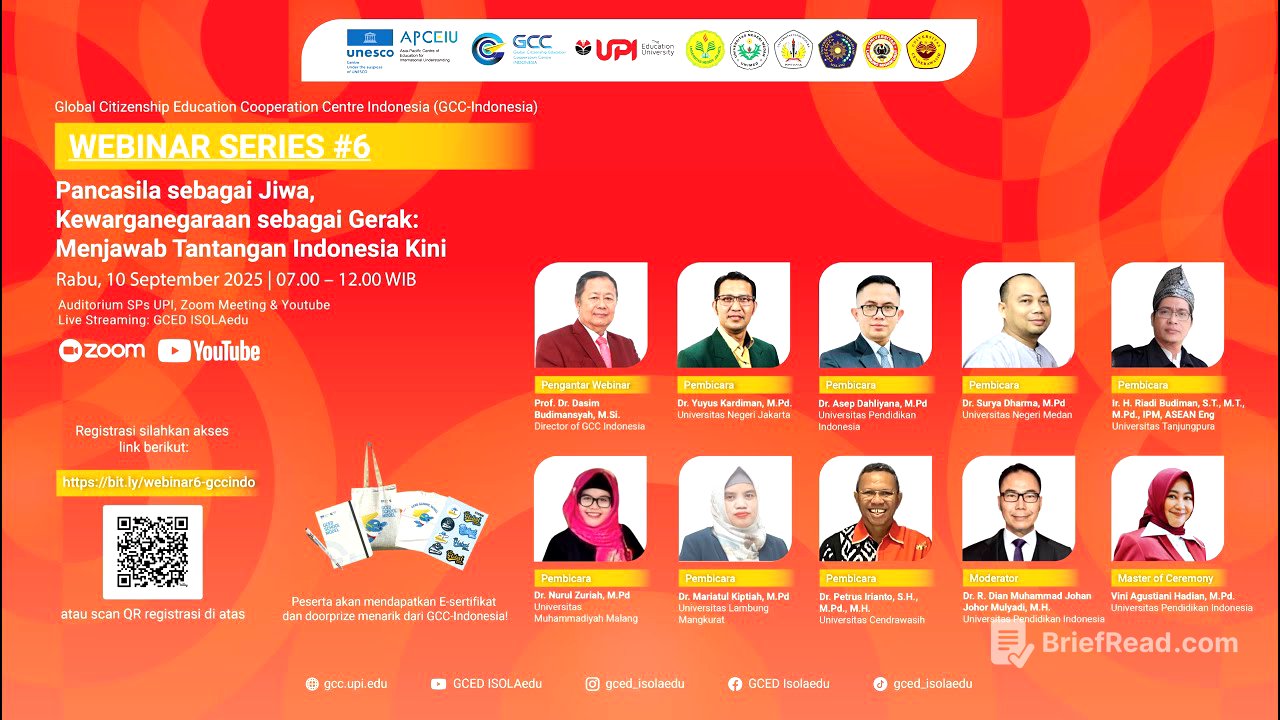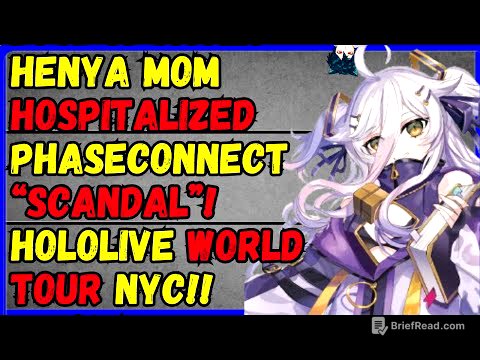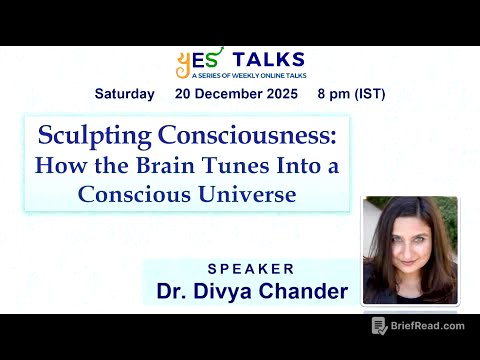TLDR;
This YouTube video features a talk show on Pancasila and Civic Education, focusing on Pancasila as a civic spirit and a movement to address Indonesia's current challenges. The event includes welcomes, speeches, a prayer, a song, and discussions by various speakers from different universities across Indonesia. The speakers discuss the philosophical dimensions of Pancasila, citizenship as a collective movement, challenges of diversity and social polarization, digital ethics and literacy, and the integration of Pancasila values in local wisdom. The talk show aims to inspire students to internalize Pancasila values and promote unity, justice, and sustainability.
- The importance of Pancasila as the soul of the nation and its role in addressing current challenges.
- The need for digital ethics and literacy in the era of artificial intelligence and society 5.0.
- The integration of Pancasila values in local wisdom and the promotion of unity and diversity.
Introduction and Welcoming Remarks [2:33]
The talk show begins with welcoming remarks from representatives of the Indonesian University of Education and the Global Citizenship Education Corporation Center Indonesia. The event aims to discuss Pancasila as a civic spirit and a movement to address Indonesia's current challenges. Participants are reminded to maintain digital etiquette and are informed about quizzes and activities planned during the event with attractive prizes.
Opening Remarks by the Head of the General Subject Division [14:42]
Dr. Wawan Hermawan opens the event by questioning whether Pancasila truly serves as the soul of the nation in national and state life, or if other factors overshadow it. He reflects on the crisis of role models in society and encourages everyone to start embodying Pancasila's values from within themselves. He officially opens the talk show, emphasizing the importance of answering Indonesia's challenges through civic education.
Prayer Reading [23:06]
Mr. Risris Hari Nugraha leads a prayer, asking for smoothness and blessings for the meeting, and for the spirit of Pancasila to be planted in everyone's soul. The prayer seeks guidance for leaders, teachers, lecturers, educators, and parents, and asks for a straight path for them to guide the younger generation.
Mars GCC Indonesia and Introduction of Director [26:31]
The Mars GCC Indonesia is played, followed by an introduction of Prof. Dr. Dasim Budimansyah, the Director of GCC Indonesia. His background in sociology and citizenship education is highlighted, along with his research focus on strengthening Pancasila character and promoting global citizenship education. He actively studies the integration of civic values, sustainability, and inclusivity in education at both national and international levels.
Talk Show Introduction by the Director of GCC Indonesia [32:44]
Prof. Dr. Dasim Budimansyah introduces the speakers and emphasizes the importance of Pancasila as the soul and citizenship as a movement to answer current challenges. He notes that Indonesia is at a crossroads, marked by technological advances, social polarization, and environmental crises. Pancasila must live as a moral energy that animates every policy and behavior, while citizenship is present in collective action and real participation. He encourages students to internalize Pancasila and maintain social cohesion amidst diversity, digital ethics, and social movements.
Poll Session [44:21]
A poll is conducted with three questions: Indonesia's biggest challenge today, the relevance of Pancasila in your life, and one word to describe Pancasila. The results show that poverty and economic inequality are seen as the biggest challenge, Pancasila is considered relevant, and various words like ideology, justice, and love are used to describe Pancasila.
Introduction of Moderator [51:57]
Mr. Dr. Erdian Muhammad Johan Johor Mulyadi is introduced as the moderator. He is a lecturer in civic education, international law, and international relations. His research includes the internationalization of Pancasila for Indonesian citizens and character education for PMI children in Malaysia.
Moderator's Opening Remarks and Background [55:03]
The moderator opens the session by asking about the history of the Pancasila greeting and emphasizing the importance of the event. He explains that Pancasila must be the soul and citizenship must become a movement to face challenges, including transnational ideologies like liberalism, communism, and radicalism.
Philosophical Dimensions of Pancasila as Soul and Nation by Dr. Yuyus Kardiman [1:04:52]
Dr. Yuyus Kardiman discusses the philosophical dimensions of Pancasila, highlighting Soekarno's comprehensive idea of Pancasila as both a philosophical foundation (filosy Grunst) and a worldview (wel Tancung). He explains that Pancasila should not only be accepted logically but also become part of the nation's life. He quotes Muhammad Hatta, stating that Indonesia should not be a religious or secular state, but a country based on Pancasila, where religious values become a source of moral spirit.
Concrete Examples and Guidance by Dr. Yuyus Kardiman [1:14:59]
Dr. Kardiman emphasizes that Pancasila should be learned, trained, and implemented in life. He explains that the soul of Pancasila means the existing spirit in someone's life, and that talking about Pancasila is talking about ourselves. He suggests that the values of divinity, humanity, nationalism, and social concern should be internalized and implemented through training, education, and respect for others.
Citizenship as Collective Movement and Action by Dr. Asep Dahliana [1:19:41]
Dr. Asep Dahliana discusses citizenship as a collective movement and action, emphasizing that citizenship education should not be stored on the memory side but should be directed at four areas: the realm of work, internal governance, public spaces, and personal behavior. He stresses the importance of participation and practice, and suggests that citizenship education should be packaged not as memorization but as a real practice.
Worthy Citizen Initiative and Importance of Goodness by Dr. Asep Dahliana [1:29:10]
Dr. Asep Dahliana highlights Ciamis as a clean area as a worthy citizen initiative that should be replicated nationally. He emphasizes the importance of discipline and starting with small things. He shares an anecdote about being asked whether being smart or good is more important, and answers that being good is more important because well-trained people wouldn't think of something being good or not when in the path of goodness.
Challenges of Diversity and Polarization by Dr. Suryadarma [1:33:48]
Dr. Suryadarma discusses the challenges of diversity and polarization, emphasizing that diversity is a sunnatullah (God-given fact) and a social capital for achieving a dream. He notes that Indonesia has approximately 1340 tribes and 2500 languages. He identifies intolerance, radicalism, hoaxes on social media, economic gaps, weak institutionalization of nationality values, extreme views of ideology, and lack of unity as challenges.
Strategies to Prevent Polarization by Dr. Suryadarma [1:45:23]
Dr. Suryadarma suggests applying strategies used in the UK to prevent polarization, such as equipping students with a curriculum to recognize fake news and extremist content online. He emphasizes the need for digital literacy and critical thinking. He also mentions that despite the challenges, Indonesia is seen as one of the most prosperous countries with strong social and religious values.
Digital Ethics and Literacy in the Era of AI and Society 5.0 by Ir. Riadi Budiman [1:51:00]
Ir. Riadi Budiman discusses digital ethics and literacy in the era of AI and society 5.0, emphasizing the importance of moral principles and the ability to access, understand, evaluate, and create information through digital technology. He identifies challenges such as a lack of understanding of digital ethics, abuse of AI, low digital literacy, and the digital divide. He suggests strategies to improve digital literacy, including early education, ethics training, strengthening regulations, and collaboration between sectors.
Maintaining Pancasila Values in Digital Space by Ir. Riadi Budiman [1:57:13]
Ir. Riadi Budiman emphasizes that the biggest challenge is maintaining Pancasila values in the digital space by fighting the spread of divisive content. He stresses the need for collective awareness and education to make digital space a reflection of Pancasila. He also warns against hoaxes, hate speech, and unethical behavior that ignores values of mutual cooperation and social justice.
Inspiration for the Citizenship Movement for the Future by Dr. Nurul Zuriah [1:59:35]
Dr. Nurul Zuriah discusses the inspiration for the citizenship movement for the future, noting the complex challenges Indonesia faces, including social polarization, technological disruption, identity polarization, and a digital ethics crisis. She suggests five key movements: ethical digital statehood, environmental care, inclusive humanity, and friendship. She emphasizes the importance of connecting values, cultural dialogue, and local wisdom.
Inspirational Message and Key Movements by Dr. Nurul Zuriah [2:12:18]
Dr. Nurul Zuriah shares an inspirational message, emphasizing the need for a tribal movement rooted in Pancasila, moving inclusively, and working globally. She quotes Bung Karno, stating that a great nation is one that never loses its soul, and encourages everyone to care for that soul with Pancasila and the citizenship movement.
Integration of Pancasila and PKn Values in Local Genius by Dr. Mariatul Kiptiah [2:14:40]
Dr. Mariatul Kiptiah discusses the integration of Pancasila and PKn values in local genius in Banjarmasin. She explains how the five precepts of Pancasila align with local culture, traditions, and economic systems. She highlights the importance of interaction of the curriculum and local content in PKn subjects.
Challenges and Solutions by Dr. Mariatul Kiptiah [2:26:17]
Dr. Mariatul Kiptiah identifies challenges such as limited knowledge of local culture, constraints of the standardized national curriculum, and a generation gap in cultural understanding. She suggests solutions such as teacher professional development, mentorship programs, developing collaborative resources, and building partnerships between schools, communities, and cultural institutions.
Papuan Perspective: Mutual Cooperation as an Example for Indonesia by Dr. Petrus Irianto [2:31:04]
Dr. Petrus Irianto presents the Papuan perspective, emphasizing mutual cooperation as a role model for Indonesia. He explains that the concept of PKn originated from Indonesia and is enshrined in the Constitution. He highlights the value of mutual cooperation in Papuan society through the system of kinship, sea sasi or land sasi, and mutual cooperation in building houses.
Papuan OB Values and Conclusion by Dr. Petrus Irianto [2:38:52]
Dr. Petrus Irianto explains that Papuan OB values can remind the nation to help each other, prioritize the common interest over personal interests, and maintain balance in nature and society. He concludes that the value of togetherness and Papuan mutual cooperation is a valuable legacy that, if applied widely, will make Indonesia a strong, fair, and patient nation.
Musical Performance [2:45:55]
Nadya Sifa Rahma performs two songs, including "Paper Boat" and a Sundanese regional song, showcasing collaboration between lecturers and students in art.
Panel Discussion: Connecting Pancasila, Citizenship, and Action [2:55:34]
The speakers discuss how to connect Pancasila as a value and citizenship education as action. Dr. Yuyus Kardiman emphasizes that Pancasila must be a guideline to move on in life, and citizenship must be trained and learned. Dr. Asep Dahliana states that Pancasila must be presented, grounded, and become part of daily lives. Dr. Suryadarma emphasizes that Pancasila must be brought to life as an ideology and realized in collective action.
Panel Discussion: Digital Ethics, Diversity, and Local Wisdom [3:10:10]
Ir. Riadi Budiman emphasizes the importance of maintaining ethics and digital literacy, and the need for strategies such as early literacy education and government regulations. Dr. Nurul Zuriah emphasizes the need to care for the soul and energy, and to move inclusively and work globally. Dr. Mariatul Kiptiah emphasizes the importance of aligning local values with Pancasila values and implementing them collectively.
Panel Discussion: Pancasila as a Guideline and Local Values [3:26:23]
Dr. Petrus Irianto explains that the points of Pancasila should be a guideline for action, and that values such as mutual cooperation, simplicity, independence, justice, equality, and reconciliation with nature should be internalized and applied.
Second Poll Session and Responses [3:30:05]
A second poll is conducted, asking what action participants most want to do to keep national unity and whether they are ready to be a Pancasila activist on campus. The results show that voicing positive messages on social media is the most desired action, and most participants are ready to be Pancasila activists.
Interactive Q&A Session [3:47:32]
Participants ask questions about improving digital literacy, addressing the phenomenon of demonstrations, and the role of Pancasila in evaluating democracy. The speakers provide answers and insights based on their expertise.
Quiz and Prize Distribution [4:04:15]
A quiz is conducted, and prizes are distributed to the winners. The event concludes with a group photo and closing remarks.









